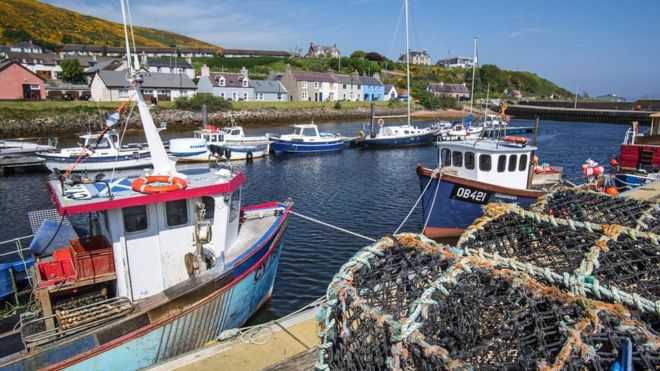-
 play_arrow
play_arrow
BayRadio Listen Live Broadcasting in Spain
EU fishing rules: Did the UK throw away a million tonnes of fish?


Claim: UK fishermen were “throwing back a million tonnes of fish dead” every year because of the EU’s Common Fisheries Policy (CFP), according to Conservative MP Owen Paterson.
Reality Check verdict: No one has ever come up with a credible figure of one million tonnes for UK fishermen alone. It’s true that UK fishermen were required by EU rules in the past to throw back unwanted or undersized fish – although exactly how much is not known. The EU started reversing these rules in 2016 and by 2019 vessels weren’t allowed to throw back any fish subject to quotas. There’s some evidence discarding is still happening, though, despite the rule change.
The Conservative MP and former Environment Secretary Owen Paterson told BBC Radio 4’s Today programme that Brexit would allow the UK to become “an independent maritime nation” and “stop the complete horrors” of the EU’s Common Fisheries Policy (CFP).
He said, under CFP rules, UK fishermen were “throwing back a million tonnes of fish dead as pollution every year”.
The UK remains part of the Common Fisheries Policy – which sets the rules on how EU members fish – until the end of the transition period, at the end of this year. The system that will replace it is still up for negotiation.
So what do the rules say?
Until relatively recently, EU member states – including the UK – were required to throw some fish back into the water.
This controversial practice was known as “discarding” and involved returning unwanted catches back to sea (dead or alive) because they were too small or because the crew had exceeded their quota – the amount of fish they were allowed to catch.
How many fish were discarded?
There is no single accepted figure for this.
A 2005 study estimated that 500,000 to 800,000 tonnes of fish were discarded in the North Sea each year, but it did not attribute this to any one country.
In 2008, a report from the World Wide Fund for Nature (WWF) put the figure for the North Sea at one million tonnes. Again it did not single out the UK. This was calculated by subtracting kilos of fish sold from kilos of fish caught.
In 2010, University of Exeter scientists put the figure at 267,000 tonnes of fish discarded in the North Sea in 2010 – and said this figure had declined from about 500,000 tonnes in 1990.
A House of Lords report published in 2019 said that in 2013 an estimated 1.7 million tonnes of fish and “other marine animals” were being thrown back into the sea each year across European waters – again not specifically by UK fishermen.
The National Federation of Fishermen’s Organisations (NFFO) told us they did not recognise the one million tonnes figure quoted by Mr Paterson and did not believe an estimate of discarded fish could be reached.
But the rules have changed
From January 2015 onwards, the EU started reversing its policy on discarding. It introduced a “landing obligation” on fishermen to keep the fish they caught.
This first applied to “pelagic” species of fish (including mackerel and herring) before being extended from 2016 to bottom-dwelling fish (including cod, haddock and plaice).
By January 2019, vessels weren’t allowed to discard any species of fish for which quotas were used to limit the numbers caught.
We spoke to Mr Paterson. He said he was referring to the situation under the old rules but added that he “knew the discard ban was not going to work”.
While he believed the one million figure to be a widely recognised estimate, he acknowledged that “the reality is, we don’t know”.
Is discarding still happening?
The discard ban has “proven challenging to implement”, according to Louisa Casson, oceans campaigner at Greenpeace UK.
“There are many proposed solutions, including observers and CCTV on boats, but none of these are in place across the entire UK fishing fleet,” she said.
And there is some evidence vessels are still discarding fish, including video and photographic evidence of illegal discards happening off the coast of Scotland gathered by campaign groups Our Fish and Open Seas.
A House of Lords report on the landing obligation policy, published in February 2019, said: “Little attempt appears to have been made to enforce the landing obligation’s requirements thus far, allowing the discarding of fish to continue.”
The NFFO said that while the ban was working well for some types of fishing, for others there were “fundamental difficulties caused by the design of the legislation” which required a “fundamental overhaul”.
Written by: BayRadio News
Similar posts
Recent Posts
- Physical Exercise and a Balanced Diet Help COPD Patients Improve Their Quality of Life
- Spanish Speakers Surpass 600 Million Worldwide, but Could the True Figure Be Even Higher?
- Dr Julio Puig, expert in breast surgery
- Meniscus Injuries or Ligament Tears? Forget About Knee Pain
- More than 120,000 patients treated: Quirónsalud Torrevieja, a benchmark in oncology and breast cancer treatment

Ctra. Cabo La Nao, CC La Nao, Local 6 03730 Javea, Alicante, Spain
Advertise with us
Do you have a business in Spain? Do you provide a service to the expat community in Spain? Would you like your message to reach over 500.000 people on a weekly basis?
BayRadio is a community orientated radio station offering fantastic content to our many listeners and followers across our various platforms. Contact us now and find out what Bay can do for you!
Our business is helping your business grow.
BAY RADIO S.L. © 2024. ALL RIGHTS RESERVED. WEB DESIGN BY MEDIANIC







